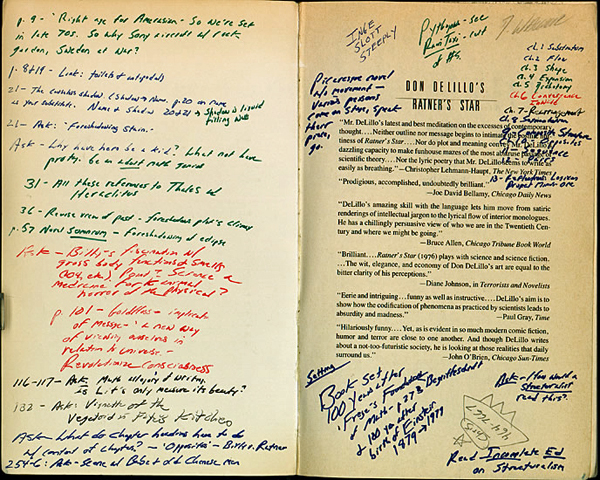Marginalia: Do you scribble in your books?

Inside cover of David Foster Wallace’s annotated copy of Don DeLillo’s Ratner’s Star. (Harry Ransom Center)
While I find little need to defend my appetite for marginalia, I’m intrigued by Harriet Devine’s post about marginalia. To be more precise, I’m especially interested in the conversation generated by her post. Much like the underlying premise for the Huffington Post, the comments generated by a post are often where the greatest value lies.
Author and professor Harriet Devine (@drharrietd) opens her reflection with a memory collected at Oxford. A tutor borrowed her book about Coleridge and returned it blooming with marginalia.
[The tutor] had scribbled very rude comments all over it. I was slightly shocked, but he told me the book would be worth a lot more in the future because it. ~ Harriet Devine
I’d be ticked with a tutor — or even a friend — muddling my margins without first asking permission, all the more so when he assured me that it would one day increase the value of my copy (arrogant prig!) While I’m a seasoned marginalia scribbler, I feel proprietary about my books. Now if the tutor had first asked permission, and if I had a great deal of respect for his thinking, I might well have encouraged him to fill the margins of my book. Value added. But I’m getting distracted…
Defense of Marginalia
Devine references a defense of marginalia from Mortimer J. Adler‘s How to Read a Book which she’d stumbled onto via Maria Popova‘s always clever Brain Pickings.
When you buy a book, you establish a property right in it, just as you do in clothes or furniture when you buy and pay for them. But the act of purchase is actually only the prelude to possession in the case of a book. Full ownership of a book only comes when you have made it a part of yourself, and the best way to make yourself a part of it — which comes to the same thing — is by writing in it.
Why is marking a book indispensable to reading it? First, it keeps you awake — not merely conscious, but wide awake. Second, reading, if it is active, is thinking, and thinking tends to express itself in words, spoken or written. The person who says he knows what he thinks but cannot express it usually does not know what he thinks. Third, writing your reactions down helps you to remember the thoughts of the author.
Reading a book should be a conversation between you and the author. Presumably he knows more about the subject than you do; if not, you probably should not be bothering with his book. But understanding is a two-way operation; the learner has to question himself and question the teacher, once he understands what the teacher is saying. Marking a book is literally an expression of your differences or your agreements with the author. It is the highest respect you can pay him. (Harriet Devine)
Comments on/as Marginalia
Though not routinely a commenter on Devine’s blog I felt compelled to weigh in, starting with my thoughts about the presumptuous tutor and then slipping into a goofy rant provoked by the [mostly] whiny comments.
While I don’t NEED to write in the margins to fully own a book, rare is the occasion I make it spine-to-spine without charting my course in the white space. I’m amazed how many commenters in this post have recoiled or at least scoffed at the practice. What a bunch of prudish ninnies. Okay, I’m hot-talking, in part because I too sometimes abstain. This is especially the case in handsomely bound hard cover books. Yes, I’m a bit prudish, I admit. And yet paperbacks welcome my pen like the lonely girl hugging the wall at the dance. “Spill your ink on my virgin margins!”, she practically gushes. I flatter myself? Perhaps. And yet, I can’t help but believe that marginalia is as human an instinct as humming in the shower (and as handy a tool as those blessed commonplace books you’re all on about.) Try it, folks. You may quickly be hooked. And for those who lament reading a text marred with previous readers’ marginalia, I say fair enough. Library books are off limits. And borrowed books. But your own paperback books? Dive in. It’s sheer bliss!
Sure, I got a bit carried away. Blog comments are like that sometimes, but take a look at what I was up against:
No never! If I am going to have a “discourse” with a book then I’ll make my notes on paper (or electronically) just as I did when I was a student. I do not agree that marking a book “keeps me awake” in any way at all, though to be fair since I have never done it I cannot really comment properly. I do agree that making notes is often essential, but I don’t want to read someone elses opinion on a book unless I actively seek it out, so I’m absolutely not a reader of pre-marked texts! ~ Dark Puss
I wouldn’t deface a book, my notes are in separate notebooks. The notes are particularly useful when blogging(!) but if I’m going back to re-read a book I don’t want to see scribbled notes and markings – it’s too distracting and would take away the pleasure of reading! ~ kaggsysbookishramblings
I could never bring myself to actually write in one of my books either, much as I love finding the marks and thoughts of former owners. I do dog-ear the pages which contain passages of interest, though, even though that also causes dismay. ~ Karyn
I’ve always wanted to but can’t make myself do it. I wonder what that says about me?? I’ve always enjoyed reading other people’s marginalia as it often says more about that person than the book itself! ~ sakura
I never write in my books. I did that when I was a teenager, usually underlining passages in inexpensive paperbacks of classics. But now, never. I use my commonplace books. ~ Joan Kyler
You get the gist. While I do hope that I didn’t scare off Devine’s eager commenters, I was genuinely surprised at how few embraced marginalia. I suppose that I never before realized that I might be the odd one out when it comes to note-taking and doodling and all manner of esoteric hieroglyphics in the margins of my books. Which begs the question, perhaps others don’t hum in the shower either? Or maybe they do but don’t admit it? Or don’t because years of virtuous restraint have made it easy/ier to scrub up and rinse without crooning into the shampoo container.
Marginalia and Pudding
Now, lest I misrepresent the commenters, here are two kindred souls.
The horrors! Well, they haven’t addressed the all-important pen/pencil question – I do write in pencil, and I do like the idea of recording my thoughts somewhere on the physical copy (but never in pen), but it can never really be a two-way exchange, can it? Not unless we ship the book back to its author to see what he/she thinks.
And as for the person who borrowed your book – that’s just the very worst sort of rudeness – not only rude, but arrogant and unrepentant. What an awful thing to do! ~ Simon T
I’m going to have to pipe up and say that I do write in my books–and in pen! Sometimes when I get a library book, I get annoyed that I can’t write in it, so I keep sticky notes handy to make notes on and stick on the relevant pages (useful for writing a review). I don’t write in every book, just the ones I’m really engaged in or want to argue with. I’m also what Anne Fadiman would call a “carnal lover” of my books, so broken spines, dog-eared pages, and so on are not unusual. However, I would never say that you have to write in a book to fully own it. ~ Teresa
Thank you, Simon and Teresa. And thank you Harriet Devine (@drharrietd) for the conversation you inspired. After all, the comments beneath a blog post are not altogether unlike marginalia, a conversation with the author, ourselves and the other readers. Sometimes the proof is in the pudding.
Related articles
- Graffiti and Marginalia (virtualdavis.com)
- Marginalia: Billy Collins (virtualdavis.com)
- Marginalia (harrietdevine.typepad.com)
- Friday Reads: “The Art of Marginalia” by Jocelyn Kelley and “The Psychology of Books” by Dell Smith (criticalmargins.com)
- Less Literal, More Literary (virtualdavis.com)




I NEVER used to write in my books at all until I was in college. I’m not sure what made the change in me. I had seen books written in that I used in high school, and sometimes those writings were helpful, but it wasn’t until college that I did it myself. Because they were now my books instead of books belonging to the school? Because I saw others doing it? Nevertheless, it was very helpful for me to write, underline, use arrows etc. in my schoolbooks. Novels on the other hand are a different matter, and I treat them differently. I don’t think I’ve ever written in one.
I’ve underlined and written in the margins of my own books since I was in high school. I underline, highlight and make notes in all book, fiction and non-fiction. I LOVE grabbing a book off my shelf (novels especially!) I read 10-15+ years ago to see what passages I underlined.
I should have included the school books exemption for marginalia… Especially as a former teacher. And it just makes owning your own books in college that much more exciting! Why don’t you scribble notes in the margins of novels, Katie? Sacred space? ;-)